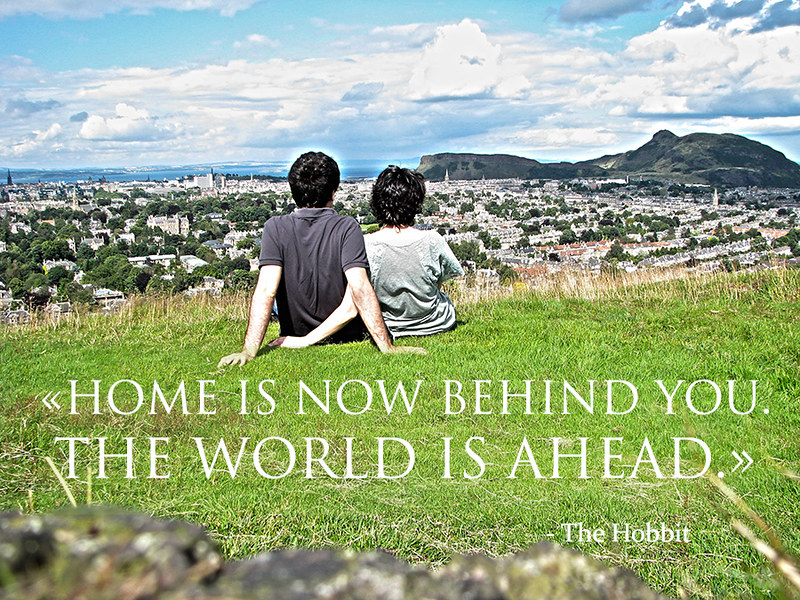I originally wrote and published this article in Spanish.
As we brace ourselves to move abroad for the third time in a few years, I look back and I know that squeezing our lives into a suitcase and leaving our native Barcelona was the best decision that we could have possibly made. Because when you move away, when you turn your life into a journey filled with uncertainty, you grow up in unexpected ways.

You face new challenges, you get to know parts of you you didn’t know existed, you’re amazed at yourself and at the world. You learn, you broaden your horizons. You unlearn, and after coming down and embracing a few lessons, you start growing in humility. You evolve. You feel homesick… and you shape memories that will stay with you forever. If you’ve ever lived away from home or embarked on a long journey, I’m sure you too have felt these 17 things that change forever when you live abroad.
1. Adrenalin becomes part of your life.
From the moment you decide to move abroad, your life turns into a powerful mix of emotions – learning, improvising, dealing with the unexpected… All your senses sharpen up, and for a while the word “routine” is dismissed from your vocabulary to make space for an ever rising adrenalin thrill ride. New places, new habits, new challenges, new people. Starting anew should terrify you, but it’s unusually addictive.
2. But when you go back… everything looks the same.
That’s why, when you get a few days off and fly back home, it strikes you how little everything has changed. Your life’s been changing at a non-stop pace, and you’re on holidays and ready to share all those anecdotes you’ve been piling up. But, at home, life’s the same as ever. Everyone keeps struggling with their daily chores, and it suddenly strikes you: life won’t stop for you.
3. You lack the (and yet you have too many) words.
When someone asks you about your new life, you lack the right words to convey all you’re experiencing. Yet later, in the middle of a random conversation, something reminds you about ‘that time when’…, and you have to hold your tongue because you don’t want to overwhelm everyone with stories from your ‘other country’ and come across as pretentious.

4. You come to understand that courage is overrated.
Lots of people will tell you how brave you are – they too would move abroad if they weren’t so scared. And you, even though you’ve been scared, too, know that courage makes up about 10% of life-changing decisions. The other 90% is purely about wanting it with all your heart. Do you want to do it, do you really feel like doing it? Then do it. From the moment we decide to jump, we’re no longer cowards nor courageous – whatever comes our way, we deal with it.
«It’s a dangerous business, Frodo, going out your door. You step onto the road, and if you don’t keep your feet, there’s no knowing where you might be swept off to.»
5. And, suddenly, you’re free.
You’ve always been free, but freedom feels different now. Now that you’ve given up every comfort and made it work thousands of miles away from home… you feel like you’re capable of anything!

6. You no longer speak one particular language.
Sometimes you unintentionally let a word from another language slip. Other times you can only think of a way of saying something… with that perfect word which, by the way, is in the wrong language. When you interact with a foreign language on a daily basis, you learn and unlearn at the same time. All the while you’re soaking up cultural references and swear words in your second language, you find yourself reading in your mother tongue so it won’t get rusty. Like that time when Homer took a home winemaking course and forgot how to drive.
7. You learn to say goodbye… and to enjoy yourself.
You soon realize that now, most things and people in your life are just passing through, and you instinctively play down the importance of most situations. You perfect the right balance between bonding and letting go – a perpetual battle between nostalgia and pragmatism.
8. You have two of everything.
Two SIM cards (one of them packed with phone numbers from all over the world), two library cards, two bank accounts… And two types of coins, which always end up mysteriously mixing when you’re about to pay for something.
9. Normal? What’s normal?
Living abroad, like traveling, makes you realise that ‘normal’ only means socially or culturally accepted. When you plunge into a different culture and a different society, your notion of normality soon falls apart. You learn there are other ways of doing things, and after a while, you too take to that habit you never thought you’d embrace. You also get to know yourself a little better, because you discover that some things you really believe in, while others are just a cultural heritage of the society you grew up in.
10. You become a tourist in your own city.
That tourist trap you may not have visited in your country only adds up to the never-ending list of things to do in your new home, and you soon become quite the expert on your new city. But when someone comes over for a few days and asks for some suggestions, you find it really hard to recommend but a few things – if it were up to you, you’d recommend visiting everything!

11. You learn how to be patient… and how to ask for help.
When you live abroad, the simplest task can become a huge challenge. Processing paperwork, finding the right word, knowing which bus to take. There’s always moments of distress, but you’re soon filled with more patience than you ever knew you had in you, and accept that asking for help is not only inevitable, but also a very healthy habit.
12. Time is measured in tiny little moments.
It’s as if you were looking through the car window – everything moves really slowly at the back, in the distance, while in front of you life passes by at full speed. On the one hand, you receive news from home – birthdays you missed, people who left without you getting the chance to say goodbye one last time, celebrations you won’t be able to attend. On the other hand, in your new home life goes by at top speed. Time is so distorted now, that you learn how to measure it in tiny little moments, either a Skype call with your family and old friends or a pint with the new ones.
13. Nostalgia strikes when you least expect it.
A food, a song, a smell. The smallest trifle can overwhelm you with homesickness. You miss those little things you never thought you’d miss, and you’d give anything to go back to that place, even if it were just for an instant. Or to share that feeling with someone who’d understand you…
14. But you know it’s not where, but when and how.
Although deep down, you know you don’t miss a place, but a strange and magical conjunction of the right place, the right moment and the right people. That year when you traveled, when you shared your life with special ones, when you were so happy. There’s a tiny bit of who you were scattered among all the places you’ve lived in, but sometimes going back to that place is not enough to stop missing it.

15. You change.
I’m sure you’ve heard about life-changing trips. Well, they’re not a commonplace – living abroad is a trip that will profoundly change your life and who you are. It will shake up your roots, your certainties and your fears. Living in Edinburgh changed us forever in many ways, and if it weren’t for that experience, we probably wouldn’t be about to embark on our next life adventure right now. Maybe you won’t realise it, or even believe it, before you do it. But after some time, one day you’ll see it crystal clear. You’ve evolved, you’ve got scars, you’ve lived. You’ve changed.
16. You fit your home into a suitcase.
From the moment you squeeze your life into a suitcase (or, if you’re lucky with your airline, two), whatever you thought ‘home’ was doesn’t exist anymore. Almost anything you can touch can be replaced – wherever you travel, you’ll end up stockpiling new clothes, new books, new mugs. But there will come a day when you’ll suddenly feel at home in your new city. Home is the person traveling with you, the people you leave behind, the streets where your life takes place. Home is also the random stuff in your new flat, those things you’ll get rid of in the blink of an eye when the time to leave comes. Home is all those memories, all those long-distance calls with your family and friends, a bunch of pictures. Home is where the heart is.

17. And… there’s no turning back.
Now you know what it means to give up comfort, what starting from scratch and marveling at the world every day feels like. And it being such a huge, endless world… How could you choose not to keep traveling and discovering it?
Have you ever lived abroad? Is there anything you would add to this list? Drop us a comment and tell us about your experience!
I originally published this article in Spanish a few weeks ago. Lots of people asked for an English version, but please bear in mind English is not my native language and this is only a humble attempt at a translation. I apologise in advance for any mistakes – if there’s anything you’d like to point out, please drop me a comment below. Thank you! Angie
ORGANIZA TU VIAJE
ATRACCIONES
Ahorra en Edimburgo con el billete Royal Edinburgh
AEROPUERTO
Reserva el bus del aeropuerto al centro de Edimburgo
TOURS EN ESPAÑOL
- Disfruta de la visita guiada al Castillo de Edimburgo
- Reserva el Tour gratis por Edimburgo
- Reserva el Tour gratis de Harry Potter y Edimburgo
EXCURSIONES POR ESCOCIA
Reserva las más populares:
SEGURO DE VIAJE
Imprescindible. Nosotros siempre usamos el de Heymondo con un 5 % de descuento para viajar en cualquier fecha (15 % para familias).
Paga en £
Nuestra tarjeta favorita para viajar y ahorrar comisiones es Revolut, que ofrece 10 € de bienvenida aquí.
INTERNET UK
Compra una tarjeta con datos ilimitados y conéctate desde el primer minuto con un 5 % de descuento.
HOTELES
Consigue las mejores ofertas reservando hotel en Edimburgo con antelación.










I’ve been living as an Ex-pat for almost 18 years. It’s a wonderful life! Thank you for a well-written article that really resonates with me. Your English is fantastic!! Please, translate more of them for us!!
I lived overseas for 12 years and #3 is absolutely spot on. I had SO MANY fantastic experiences that it often became very difficult to talk about some of them when I was back home in London with friends who had never lived outside of a 10 mile radius from where they grew up.
Great article (and well translated). You really captured the experience from start to finish.
Me encanto tu articulo describes en un modo muy real todo lo que se vive fuera de tu pais y tambien cuando vuelves.
Seating alone in my living room checking my emails and facebook and doing nothing because it’s my only half day off of the week. I was nostalgic to our Sunday family gathering back home where all uncles, aunties and cousins gather for lunch at granny’s house. When I came across your article I felt happy knowing I’m not the only one. It actually made me feel proud of myself, which doesn’t usually happen By the way, and what I’ve achieved since I moved from Morocco to Northern Ireland over 10 years ago. I didn’t speak English at all and all my qualifications including my degree were not recognised here. I had to start from scratch again; I learned English and did lots of studying to gain 3 GCSEs including English Literature and other qualifications to get a decent job. I now run my own successful company of 10 employees. When I go back “home” I miss home (here), I get that feeling of being ‘rootless”. The words home, my house, friends have different meanings depending on where I am. I sometimes wonder if I will be this same person if I stayed in my original home; would I be this strong, independent, determined, resilient and focused person? Maybe not! Because when we live in a comfortable environment surrounded by people who look after us i.e family, we don’t get the opportunity to face millions of challenges and obstacles to push ourselves to develop independently. What you said about the use of words of your native language in your learnt language is spot on. I speak 3 languages and I still mix up words especially when I’m tired which is nearly every day. Thank you for your article, it’s brilliant”
I moved from my native England in 1998, aged 28, to start a new life in Australia. I struggled a lot in the early days because things were very similar to the UK, but that was the problem. It was hard to discern the differences.
In 2005, I moved to France, but despite the language barrier, it was easier in some ways because I knew there would be big differences.
Finally, in 2010, I moved to my current country, USA, where I now have the skills to understand what differences to look out for.
In terms of home, I am home right now. I look back in my life and see home as it was then, but I do not yearn for that home, because it is in the past. They are previous chapters in my life, and when I look back, it’s almost like it happened to another person, not me.
I do have a mantra “never go back”, I prefer to look forward, and only back to review my memories from time to time. But it’s easy not to go back as I have no family back there.
I liked your article. You concluded almost everything except that you have to “forget your previous way of living”, clear your mind and act and live like your new co-citizens. Not necessarily give up your traditions and culture but become accustomed to the new culture. This will help you to become easier a member of the new society. It will not only make your everyday life easier, but will also broaden your mind and make you more adaptable. The sentence “I am not used of doing that” doesn’t apply abroad.
P.S. In your pre-last sentence you say “humble attempt at a translation”. I think the right preposition is “for” not “at”. Be well 🙂
No, she’s right, it’s “an attempt at”.
I so agree, thank you for sharing 🙂 Kjersti from Norway, living in Mongolia 🙂
I agree too. Identify with it all! And BTW Kjersti from Norway, nice to see a familiar face from GZ
Hola Angie.
Soy Malcolm.
Soy escoces, vivo en Canada, pero hace 4 meses mi esposa y yo vivmos en Mexico para escapar el frio del invierno. Lo que le hace mucho mas facil es que mi esposa es mexicana y tiene familia en el pueblito en que ya vivimos. (Por supuesto estoy aprendiendo espanol muy lentamente.)
Me gustaba mucho esta blog, y reconozco lo que tu dices – es verdad.
Gracias.
Malcolm
Only things that I would add are “You learn humility” and “No Fears, No Worries and No Regrets”. 1) You see there is no “One Way to Do Things”. You have to let go of old ways of doing and thinking about things, and accept that you may not have been given all or even the correct information about people, society, etc. 2) You stop fearing what might or might not happen in the future, you’re too involved in the present to worry about it, and you accept what has happened in the past without regret.